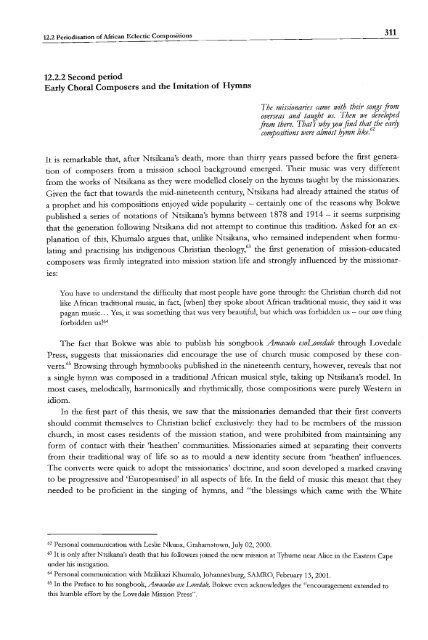South African Choral Music (Amakwaya): Song, Contest and the ...
South African Choral Music (Amakwaya): Song, Contest and the ...
South African Choral Music (Amakwaya): Song, Contest and the ...
You also want an ePaper? Increase the reach of your titles
YUMPU automatically turns print PDFs into web optimized ePapers that Google loves.
12.2 Periodisation of<strong>African</strong> Eclectic Compositions<br />
12.2.2 Second period<br />
Early <strong>Choral</strong> Composers <strong>and</strong> <strong>the</strong> Imitation of Hymns<br />
311<br />
The missionaries came with <strong>the</strong>ir songs from<br />
overseas <strong>and</strong> tauf5ht us. Then we developed<br />
from <strong>the</strong>re. Thats wl!J!you find that <strong>the</strong> earlY<br />
compositions were almost I!J!mn like. 62<br />
It is remarkable that, after Ntsikana's death, more than thirty years passed before <strong>the</strong> ftrst generation<br />
of composers from a mission school background emerged. Their music was very different<br />
from <strong>the</strong> works of Ntsikana as <strong>the</strong>y were modelled closely on <strong>the</strong> hymns taught by <strong>the</strong> missionaries.<br />
Given <strong>the</strong> fact that towards <strong>the</strong> mid-nineteenth century, Ntsikana had already attained <strong>the</strong> status of<br />
a prophet <strong>and</strong> his compositions enjoyed wide popularity - certainly one of <strong>the</strong> reasons why Bokwe<br />
published a series of notations of Ntsikana's hymns between 1878 <strong>and</strong> 1914 - it seems surprising<br />
that <strong>the</strong> generation following Ntsikana did not attempt to continue this tradition. Asked for an explanation<br />
of this, Khumalo argues that, unlike Ntsikana, who remained independent when formulating<br />
<strong>and</strong> practising his indigenous Christian <strong>the</strong>ology,63 <strong>the</strong> fust generation of mission-educated<br />
composers was fumly integrated into mission station life <strong>and</strong> strongly influenced by <strong>the</strong> missionar<br />
les:<br />
You have to underst<strong>and</strong> <strong>the</strong> difficulty that most people have gone through: <strong>the</strong> Christian church did not<br />
like <strong>African</strong> traditional music, in fact, [when] <strong>the</strong>y spoke about <strong>African</strong> traditional music, <strong>the</strong>y said it was<br />
pagan music... Yes, it was something that was very beautiful, but which was forbidden us - our own thing<br />
forbidden US!64<br />
The fact that BOkwe was able to publish his songbook Amaculo esoLovedale through Lovedale<br />
Press, suggests that missionaries did encourage <strong>the</strong> use of church music composed by <strong>the</strong>se converts.<br />
65 Browsing through hymnbooks published in <strong>the</strong> nineteenth century, however, reveals that not<br />
a single hymn was composed in a traditional <strong>African</strong> musical style, taking up Ntsikana's model. In<br />
most cases, melodically, harmonically <strong>and</strong> rhythmically, those compositions were purely Western in<br />
idiom.<br />
In <strong>the</strong> fust part of this <strong>the</strong>sis, we saw that <strong>the</strong> missionaries dem<strong>and</strong>ed that <strong>the</strong>ir fust converts<br />
should commit <strong>the</strong>mselves to Christian belief exclusively: <strong>the</strong>y had to be members of <strong>the</strong> mission<br />
church, in most cases residents of <strong>the</strong> mission station, <strong>and</strong> were prohibited from maintaining any<br />
form of contact with <strong>the</strong>ir 'hea<strong>the</strong>n' communities. Missionaries aimed at separating <strong>the</strong>ir converts<br />
from <strong>the</strong>ir traditional way of life so as to mould a new identity secure from 'hea<strong>the</strong>n' influences.<br />
The converts were quick to adopt <strong>the</strong> missionaries' doctrine, <strong>and</strong> soon developed a marked craving<br />
to be progressive <strong>and</strong> 'Europeanised' in all aspects of life. In <strong>the</strong> field of music this meant that <strong>the</strong>y<br />
needed to be proftcient in <strong>the</strong> singing of hymns, <strong>and</strong> "<strong>the</strong> blessings which came with <strong>the</strong> White<br />
62 Personal communication with Leslie kuna, Grahamstown,]uly 02, 2000.<br />
63 It is only after Ntsikana's death that his followers joined <strong>the</strong> new mission at Tyhwne near Alice in <strong>the</strong> Eastern Cape<br />
under his instigation.<br />
64 Personal communication with Mzilikazi Khumalo,]ohannesburg, SAMRO, February 13, 2001.<br />
65 In <strong>the</strong> Preface to his songbook, Amaculao ase Lovedale, Bokwe even acknowledges <strong>the</strong> "encouragement extended to<br />
this hwnble effort by <strong>the</strong> Lovedale Mission Press".

















